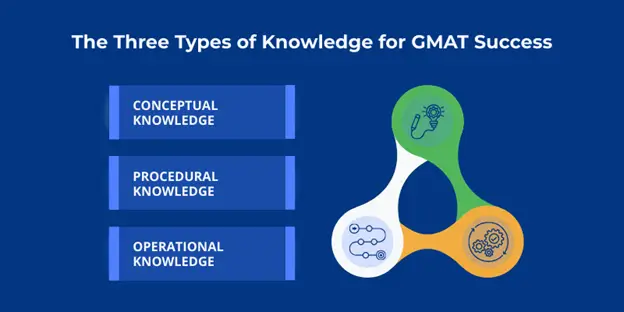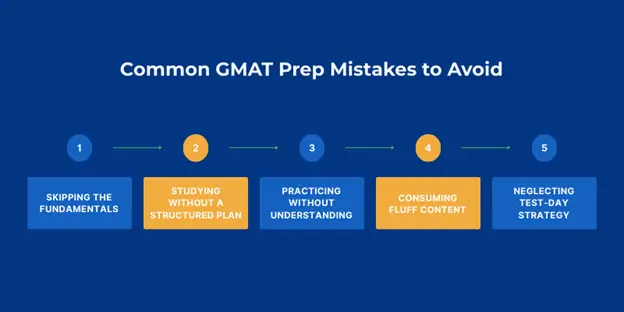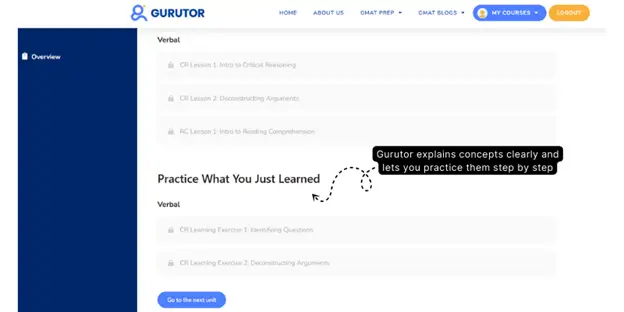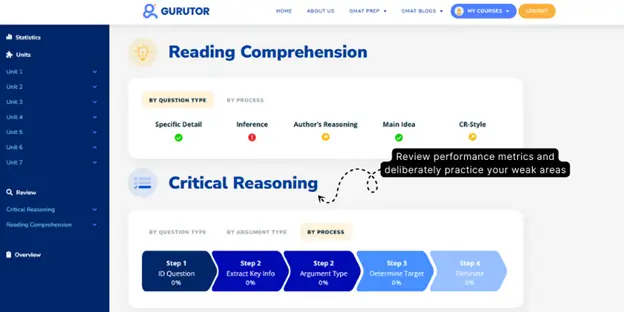Types of Knowledge for a High GMAT Score

Scoring high on the GMAT Focus Edition isn’t about cramming formulas or memorizing obscure rules.
The 2024 redesign of the GMAT format shifted the test toward what top MBA programs truly value: sharper reasoning, stronger data skills, and performance under pressure.
With just three sections in the GMAT Focus Edition, Quant, Verbal, and Data Insights, the exam eliminates outdated topics and focuses on practical, real-world problem-solving.
Therefore, it is important to master three essential types of knowledge for a high GMAT score:
- Conceptual
- Procedural
- Operational
Put simply, you need to know the material, know how to apply it, and know how to execute when it counts.
This guide breaks down each pillar and shows how Gurutor’s strategy-first prep helps you build them in a structured, efficient way, so you’re not just studying harder, but studying smarter on the path to your MBA.
The Three Types of Knowledge for GMAT Success
To reach a top GMAT score, it’s not enough to just study hard.
You need to build three distinct types of knowledge: conceptual, procedural, and operational.
- Conceptual knowledge
It’s the facts, rules, and principles you need to know cold. For example, simply recognizing which numbers are odd or even is conceptual knowledge.
- Procedural knowledge
Using the odd/even example, this means knowing that the sum of two odd numbers produces an even number, or that multiplying an odd number by an even number always yields an even result.
- Operational knowledge
You can put both of these into action on test day, solving problems quickly, managing your time effectively, and performing under pressure.
Mastering all three is what separates good test-takers from great ones, and it’s exactly the framework Gurutor uses to prepare you for a high GMAT score.

Let’s explore each in detail.
1. Conceptual Knowledge: Building Your Foundation
GMAT Conceptual knowledge is your base layer, the facts, formulas, rules, and principles that the exam expects you to know cold. Think of it as your toolkit.
Without it, even simple questions can feel impossible.
If you skip building your conceptual base, you’ll find yourself leaning on tricks or guesswork.
The Focus Edition makes this even more important.
For example, to score high in the Quant section means building conceptual knowledge and learning core topics such as:
- Remainder patterns
- Permutations vs. combinations
- Least common multiple and greatest common factor in word problems
- Difference of squares
- Factorials and so on
At this stage, your goal is simple: lock down the facts, rules, and concepts you’ll later apply to more complex problems.
The smartest way to do this is through a structured, topic-by-topic approach. Gurutor’s GMAT prep system is designed this way, ensuring you fully understand each concept before moving on.
2. Procedural Knowledge: Turning Concepts Into Problem-Solving
GMAT Procedural knowledge is what turns theory into problem-solving power.
If conceptual knowledge tells you what the rules are, procedural knowledge is knowing how and when to use them under test-like conditions.
Without it, you risk freezing when the exam disguises familiar concepts in wordy prompts or tricky data sets.
Some examples of procedural knowledge on the GMAT include:
- In Quant, spotting a work-rate problem and instantly setting up the correct equation.
- In Verbal, breaking down an argument into conclusion and evidence, then using elimination to remove wrong answers.
That said, Gurutor makes this transition seamless by transitioning you directly from lessons into realistic GMAT-style practice.
Each time you apply a concept, you get instant, detailed feedback that explains not just what you got wrong, but why.
Over time, the platform tracks your patterns, corrects your process, and builds your instincts, so solving GMAT problems becomes second nature.
3. Operational Knowledge: Performing Under Pressure
GMAT Operational knowledge is your test-day execution plan.
It’s not just about knowing the material; it’s about staying calm, managing time, and making smart decisions under pressure.
With only 45 minutes per section, pacing and focus can make the difference between a good score and a great one.
This is where strong operational skills separate top performers from the rest.
Some examples of operational knowledge on the GMAT include:
- In Reading Comprehension, quickly identifying the main idea so you don’t waste time rereading.
- In Data Insights, breaking down a complex chart step by step instead of panicking at first glance.
- In Quant, recognizing when a question is taking too long and making an educated guess to protect your pacing.
Given this, Gurutor prepares you to perform under real exam conditions with full-length GMAT Focus practice tests and detailed pacing analytics.
The platform trains you to set time, recognize when you’re off pace, and apply strategies like smart guessing.
After some time, you’ll feel like you’ve already mastered the GMAT many times in practice.
Integrating the Three GMAT Knowledge Types Into Your Study Plan
Knowing the three types of knowledge is one thing, and building them into your prep is another.
The most effective approach is to structure your study plan in phases, each with a distinct focus.
Over six months, that might look like this:
Step 1: Build Conceptual Knowledge (Months 1–2)
Focus on the fundamentals: arithmetic, algebra, statistics, and verbal reasoning patterns.
Spend most of your time (approximately 75%) learning concepts, and the rest reinforcing them through practice.
For this, Gurutor’s structured lessons and foundation modules make sure you cover every topic without gaps.
Step 2: Practice Procedural Knowledge (Months 3–4)
Shift into problem-solving mode.
Devote about 75% of your time to drills, quizzes, and sectional practice, using Gurutor’s question bank and feedback system to sharpen accuracy and speed.
The goal here is to turn knowledge into instinct.
Step 3: Develop Operational Knowledge (Months 5–6)
Take full-length, timed practice tests to refine your pacing strategies and build endurance.
Gurutor’s performance analytics show where you lose time or make careless mistakes, allowing you to adjust your approach before test day.
Here’s a concise table summarizing the 6-month phased GMAT study plan integrating different knowledge types:
| Phase | Months | Focus | Key Activities | Gurutor Support | Time Allocation |
| Build Conceptual Knowledge | 1–2 | Conceptual | Learn & review fundamentals in Quant (arithmetic, algebra, basic stats) and Verbal (critical reasoning, reading comprehension, grammar basics) | Structured lessons, modules, and foundational content reviews | ~75% learning concepts, 25% light practice |
| Practice Procedural Knowledge | 3–4 | Procedural | Solve a wide variety of practice questions; apply concepts to real GMAT problems; mix of all question types (Problem Solving, Data Sufficiency, RC, CR) | Extensive question bank, timed quizzes, sectional tests, instant feedback & detailed solutions | ~75% practice, 25% concept review |
| Develop Operational Knowledge | 5–6 | Operational | Simulate exam conditions: full-length practice tests, timing strategies, endurance & focus drills | Realistic GMAT Focus practice exams, performance tracking analytics, pacing guidance, strategy recommendations | ~50% full tests, 50% targeted practice |
With GMAT prep phasing up this way, you’ll systematically build all three types of knowledge: conceptual, procedural, and operational.
The Payoff: Benefits of Mastering These Knowledge Types
No matter if your GMAT prep lasts 3 months or 6 months, focusing on conceptual, procedural, and operational knowledge ensures you’re studying the right way.
Here’s what that gives you:
1. Complete Coverage, Zero Blind Spots
Solid fundamentals, sharp problem-solving, and proven test-day strategies mean you’re ready for anything the GMAT throws at you.
By the time you sit for the real exam, it feels less like a high-stakes unknown and more like a routine you’ve already mastered.
That confidence is what keeps anxiety from sabotaging your score.
2. Scores That Reflect Your True Ability
Students who only focus on content often underperform because timing, pacing, or stress management gets in the way.
But when you train all three areas together, you finally perform at your real level.
The moment strong content learners add full simulations and strategy training, their scores climb.
With fewer rushed errors and smarter time control, you convert ability into points.
3. Skills That Last Beyond the GMAT
This isn’t just exam prep, it’s discipline, analytical thinking, and composure under pressure.
In addition to this, the same skills that help you beat the GMAT translate directly to business school and beyond.
Therefore, the payoff of this comprehensive approach goes well beyond just one exam.
Common GMAT Prep Mistakes to Avoid

Even strong students can fall into traps that undermine their GMAT preparation.
Here are three of the most common mistakes, and how to avoid them:
1. Skipping the Fundamentals
Many test-takers rush into drills or shortcut strategies without first mastering the basics.
Without a solid grasp of core concepts, such as combinatorics, remainder rules, or inference logic, complex questions can become overwhelming.
Gurutor’s structured modules guide you through this exact process, helping you “fill the gaps” so no fundamental concept slips through.
2. Studying Without a Structured Plan
Many test-takers dive into practice questions or random video lessons without a clear roadmap. This can lead to knowledge gaps, repeated mistakes, and slow progress.
For this reason, Gurutor guides you step-by-step with tutor-style feedback that tracks your progress automatically.
3. Practicing Without Understanding
Solving hundreds of problems won’t help if you don’t pause to analyze mistakes.
Too often, students memorize patterns instead of developing true conceptual clarity. This leads to repeated errors, frustration, and plateaus.
Gurutor reinforces this by giving real-time feedback on your errors, so each practice session is a step forward, not just a grind.
4. Consuming Fluff Content
Watching hours of generic YouTube videos or reading overly verbose guides might feel productive, but they rarely build the practical skills needed to tackle GMAT questions efficiently.
Gurutor, for example, provides concise, actionable instructions on official GMAT questions, without unnecessary filler.
5. Neglecting Test-Day Strategy
Knowing the material isn’t enough; you also need the stamina and strategy for test day.
Many students underperform simply because they never practiced under timed, exam-like conditions.
The fix? Gurutor integrates timing practice and strategy training so you learn not just the “what,” but also the “how” of succeeding under pressure.
How Gurutor Helps You Master All Three Knowledge Types
Preparing for the GMAT Focus Edition means balancing concepts, practice, and strategy.
Gurutor’s GMAT prep platform is designed to keep all three in sync, so no part of your prep is overlooked:
- Self-Paced Study
Gurutor lets you learn at your own pace.
Work through modules, practice questions, and full-length tests on your own schedule, without waiting for classes or live sessions.
This flexibility ensures you can spend more time on tough concepts, revisit topics as needed, and steadily build conceptual, procedural, and operational knowledge.

- Spread Across Different Units
Early modules focus on foundational concepts with light practice, then ramp up to intensive problem-solving and timed drills, culminating in full-length practice exams.
This ensures you build knowledge systematically, just like top scorers.
- Expert Strategies Built In
Gurutor goes beyond content.
It clarifies concepts, optimizes your problem-solving approach, and builds test-day strategies like pacing and stress management into your prep, helping you integrate operational skills as you practice.
- Data-Driven Progress Tracking
Every question you answer is analyzed for accuracy, timing, and improvement trends.
Gurutor highlights areas that require more conceptual review, procedural practice, or operational refinement, providing you with actionable insights to stay on track.

With structured practice, smart modules, and real-time feedback, Gurutor mirrors the methods of expert tutoring in a scalable, personalized system.
Conclusion
Success on the GMAT Focus Edition depends on mastering the types of knowledge for a high GMAT score: conceptual, procedural, and operational.
These three pillars work together: conceptual knowledge provides the ‘what,’ procedural knowledge provides the ‘how,’ and operational knowledge trains you to execute under pressure.
Ignore any one of them, and your prep becomes unstable, like trying to balance on a two-legged stool.
That’s why Gurutor is a strong, self-paced system that guides you in building a solid conceptual base, practicing with clear, step-by-step processes, and training in realistic test conditions.
This balanced method leads to readiness and confidence on exam day.
Remember, the GMAT isn’t just about what you know; it’s about how effectively you can apply that knowledge under timed conditions.
What’s Next? Take Control of Your GMAT Prep
Planning to study for the GMAT on your own? Don’t waste hours figuring out what to do next.
With Gurutor, you get a structured, self-paced prep system that guides you through every concepts, strategies, and timed practices, so you’re never stuck guessing.
